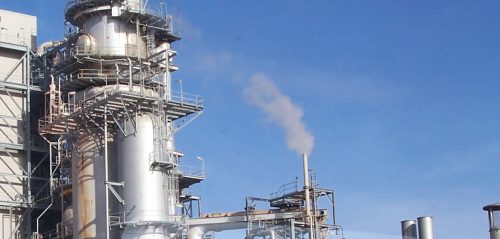Wednesday 6 June 2007 at 11:48 am

There’s been quite the flurry of stories about global warming in the news of late.
It reached a peak with last week’s report from the PM’s emissions trading task force, a document that doesn’t embrace science so much as hold it at bay except when absolutely needed. The report does at least acknowledge that the uncertainty of not planning for global warming delays investment in some areas, and therefore argues that Australia shouldn’t wait for a global system to be decided. But while it suggests committing immediately to an emissions cap, it doesn’t say what that should be, and Howard’s not made any suggestions (though he is already misquoting it).
Aside from the fact that the proposed cap-and-trade model starts very slowly (with free licences to pollute for “existing businesses identified as likely to suffer a disproportionate loss”), the report also suggests it should be one policy to rule them all — that “less efficient government policies need to be phased out”.
In this light, consider two State policies announced on Sunday against the climate change tokenism of the WA government: NSW shall be buying clean-fuel buses (done here years ago), while Queensland will spend $300 million on research and set a measly 10% target for renewable energy (although they will commit to cleaning up government buildings). Neither is all that great, but they don’t deserve to be sacrificed; Queensland’s policy at least puts some effort into much-needed research.
And at least it’s better than the Chinese government’s plan for climate change, an English version of which is here (hat-tip to David Reevely, who has an excellent overview). It basically repeats the subtext that can be seen in the Australian report (“waaah! it’ll hurt the economy!”) and focusses on things like improving efficiency and imposing regulations on manufacturers (not that I believe them; consider how easy it is to get local officials to look away). But of course, these are all things that need to be done anyway.
Australia hasn’t ratified Kyoto but has kept to target of 108% of 1990 emissions, while the Chinese failed on the self-imposed goal of 4% reduction in energy use divided by GDP (though that has decreased in the longer term). But even if they get to Western levels of efficiency, they’ll still be ramping up the number of polluting industrial facilities, which is why they should be embracing low-emissions technology now in areas like steelmaking and electricity generation. Indeed, theirs is a situation where nuclear power seems a decent solution: they need lots of energy, and can’t wait for solar panels to become cheap, but nobody wants them building hundreds more coal-fired generators that’ll pollute for decades.
And as an aside, given the concern in some quarters about WA’s boom coming to an end: I do believe that if the State government were to lift its silly ban, selling uranium to China would keep us prosperous for quite some time …
Monday 28 May 2007 at 8:08 pm

- So my last post was wrong; Wednesday’s stadium task force report didn’t officially name a preferred site. But I think this was just a political move, since it’s impossible to miss the subtext of “East Perth is best” in the report. Their concept design is undeniably awesome, and I’d love to hear a State official announce that it’ll go ahead without further delay — not that that’s likely. Also, it’s worth noting that the task force’s work is much more carefully considered than some observers seem to think — for instance, they present an almost undeniable economic case for a single multi-use stadium rather than upgrades that preserve the status quo.
- There’s only one way that the BP & Rio Tinto proposal for a new power station at Kwinana can go ahead: big bucks from Canberra. (Given that Howard is looking for policies to improve his score on climate change, that’s hardly improbable.) From a local perspective, I don’t see all too much to praise. The proposal is for their new joint venture to convert coal into hydrogen and carbon dioxide, then store the latter under the sea floor. Aside from putting yet more stress (acidification even?) on an obscenely polluted Cockburn Sound, both companies admit this’ll be much more expensive than gas-fired power. Nevermind that natural gas accounts for 30% of WA’s electricity (most of which is in new facilities) and is subject to a domestic reservation policy that makes it an awfully attractive fuel.
- Briefly, I’m reasonably impressed by the plan to relocate FESA headquarters to Cockburn, since it might stimulate further growth (for instance, some of Parramatta’s current success came from the NSW Police relocating there). But given the State Government’s record with measures like relocating the old DOLA to Midland, I’m not so sure.
- And finally, I’m amused to hear of John Edwards’ new campaign funding source: pirate treasure!
Tuesday 27 February 2007 at 11:27 pm
I quite like Mel’s term “the Ruddster”, and thus it shall henceforth be the official name of the Federal Opposition Leader on this blog, by pseudo-Royal decree.
So. Sunday’s announcement about “clean coal” — basically, the Ruddster wants to mirror-without-mirroring the Government policy of pumping money into coal power plants using technology that isn’t archaic — struck me as somewhat of a grand compromise, in that it tries to placate Peter Garrett’s crowd (look! it says ‘clean’!) while keeping unions happy.
Indeed, this is the only pattern that stands out to me when looking over his announcements from the last few months: he sticks to the centre of the playing field, doesn’t do anything all that radical or offensive, and he bends over backwards to keep everyone more or less on his side. I wasn’t old enough to ever witness Bob Hawke in action, but “The man who can bring business, government, and the unions together” was a pretty nifty campaign slogan, and the Ruddster seems to be inspired by it.
This isn’t necessarily a bad thing — heck, if Rudd can keep some peace with conservatives, it’ll save us from the divisive time we’ve had under Howard — but it also means that if he wins the election, I won’t be expecting any ground-breaking new policy direction from him. There may be an exception in the realm of foreign policy, what with the Ruddster being a former DFAT employee and all, but so far he’s been singing a pretty similar tune to past Labor leaders. Maybe this is part of the whole plan: don’t come across as a loose cannon, keep people sympathetic (or at least tolerant), and then rely on the nerdy charm to win over voters!





 Atom feed
Atom feed

